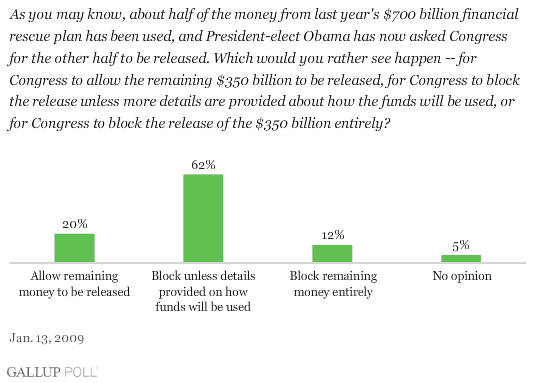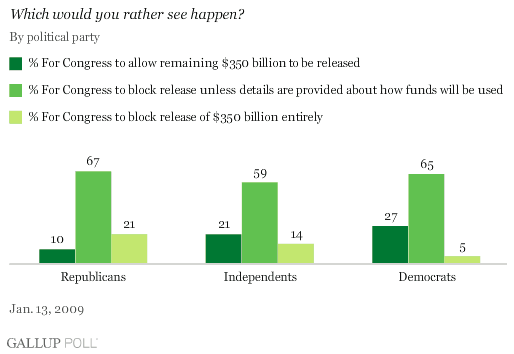PRINCETON, NJ -- A majority of Americans (62%) say Congress should block President-elect Obama's request to release the remaining $350 billion in Troubled Asset Relief Program (TARP) funds until more details are provided about how the funds will be spent. The rest of Americans are split between saying the funds should be released immediately and saying they should not be released at all.

President Bush, accommodating a request from Obama, formally asked for the release of the remaining half of the TARP funds earlier this week. The funds will automatically be released after 15 days unless Congress passes a law blocking their release. A number of congressional leaders, including some Democrats and Republicans, have threatened to do just that -- citing concerns that the Obama administration must be much more explicit about what is going to be done with the second half of the appropriated TARP money. These concerns in part reflect criticism that spending of the first half of the TARP funds was badly mismanaged.
Obama made a personal trip to Capitol Hill on Tuesday, lobbying for release of the funds and providing more details about how the money will be spent. The Senate could vote on the issue as early as Thursday.
In general, the threat of blocking the release of the TARP funds appears to be one with which the average American is sympathetic. Given three choices of what to do with the remaining funds, 62% say Congress should block the release "unless more details are provided about how the funds will be used," and another 12% say Congress should block the funds entirely. Only 20% favor Congress' simply allowing the funds to be released.
The differences by political orientation in response to this question are not as large as one might expect or as large as is typical in such situations, particularly given that the survey question explicitly referred to Obama in connection with allowing the release of the funds.

A majority of all three political groups favor blocking the funds until details are provided about how they are to be used. Democrats are somewhat more likely to say they favor just allowing the funds to be released, and Republicans are more likely to say they favor blocking the funds entirely, but both of these percentages are below 30%.
Implications
A clear majority of more than 6 out of 10 Americans are willing to have Congress block the release of the second half of the TARP funds unless more detailed explanations of how the money is to be spent are put forward. President-elect Obama has perhaps already begun to meet these requirements by going to Capitol Hill Tuesday and explaining in more detail how the money will be spent. The Obama team also put forth a letter to Congress from Dr. Larry Summers, the new head of National Economic Council in the Obama White House, that detailed how the TARP money will be spent. All of these efforts, at least as far as the American public is concerned, would appear to be justified if the $350 billion is to be released.
Survey Methods
Results are based on telephone interviews with 1,011 national adults, aged 18 and older, conducted Jan. 13, 2009. For results based on the total sample of national adults, one can say with 95% confidence that the maximum margin of sampling error is ±3 percentage points.
Polls conducted entirely in one day, such as this one, are subject to additional error or bias not found in polls conducted over several days.
Interviews are conducted with respondents on land-line telephones (for respondents with a land-line telephone) and cellular phones (for respondents who are cell-phone only).
In addition to sampling error, question wording and practical difficulties in conducting surveys can introduce error or bias into the findings of public opinion polls.
